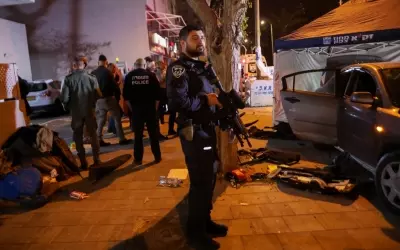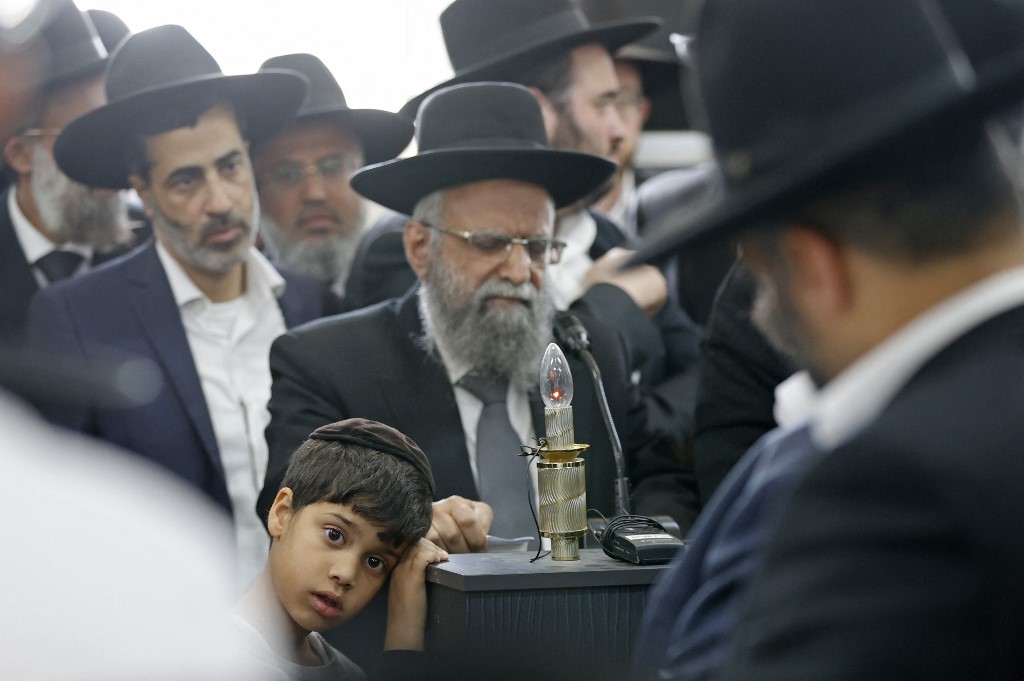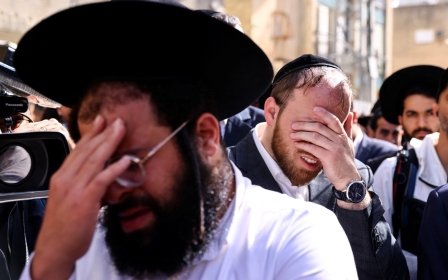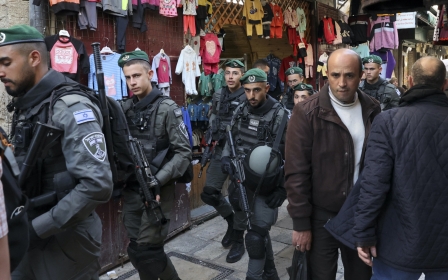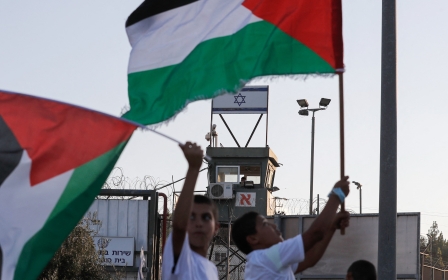Israel: Why the Palestinian attackers' Islamic State links are not as they seem
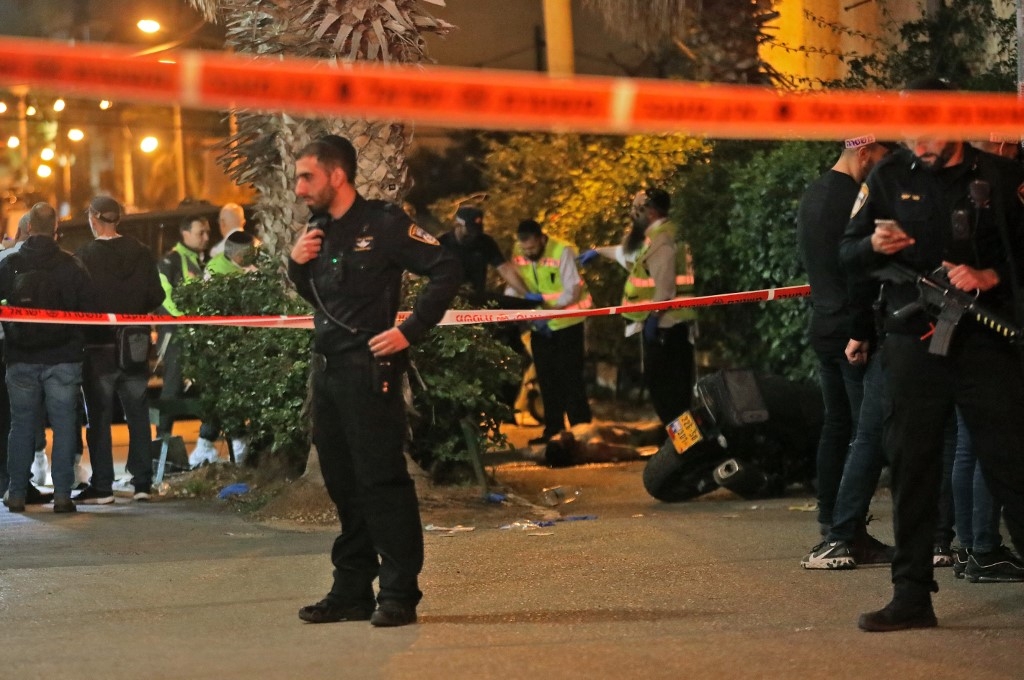
Two of the deadly attacks that claimed the lives of six Israeli last week have raised a new, unfamiliar and uncomfortable question: is Israel facing an Islamic State group (IS) threat?
All three perpetrators of the attacks in Beersheba and Hadara are suspected to have at least expressed support for the militant group in the past, according to the police. One of them tried to join the group in Syria in 2016.
In response, thousands of reserve police officers were called on duty, and authorities have been given the green light to use indefinite administrative detention (without charge or trial) against those suspected of links to IS, all in an effort to curb the threat of potential copycat attacks.
However, analysts told Middle East Eye, anxieties over IS staging operations in Israel are likely overblown, with it doubtful that the group has capabilities to launch attacks in the country.
There is a danger, experts said, of Israeli authorities using the perceived threat of IS to justify ramping up security and arrests ahead of the Muslim holy month of Ramadan, which begins next week.
The shocking murder of five Israelis in Bnei Brak by a Palestinian gunman from the occupied West Bank on Tuesday has only added to the tense security climate.
Many are warning that restrictions on Palestinian worshippers in al-Aqsa Mosque and plans to allow Israeli settlers to storm it next month could spark violence in Jerusalem and beyond, similar to the events of May last year.
Islamic State views on Israel
The Islamic State group has for years staged bloody attacks across the Middle East, Africa and the West. Yet IS operations in Israel have been both rare and somewhat unexpected.
In 2016, the group said attacking Israel or liberating Palestinian lands was not among its priorities. Writing in its weekly newspaper al-Naba, the militant group explained that its fight was first and foremost against Muslim governments, which they deem to be ruling in an un-Islamic manner.
'IS does not believe in national liberation and groups that pursue it. They want to establish a global state built on their idea of a caliphate'
- Ameer Makhoul, Palestinian activist
“The apostate [tyrants] who rule the lands of Islam are graver infidels than [the Jews], and war against them takes precedence over the war against the original infidels,” the article said.
In this light, the group also criticised Muslims who describe the Palestinian cause as the primary struggle for the worldwide Muslim community.
This sentiment was confirmed by Ameer Makhoul, a Haifa-based writer who was imprisoned for 10 years in an Israeli prison for his activism, where he spent time with inmates suspected of having IS links.
“IS does not believe in national liberation and groups that pursue it. They want to establish a global state built on their idea of a caliphate,” Makhoul told MEE.
“They want to first rid the Muslim world of infidels from within, before turning their attention to Israel. That’s what most IS inmates would say.”
Unsubstantiated IS claims
Up until last week, only one attack inside Israel was claimed by the Islamic State - an allegation that was largely dismissed.
In June 2017, three Palestinians from the West Bank killed a policewoman in occupied East Jerusalem amid a wave of attacks at the time.
'The Israelis killed in the attack and those who carried them out are all victims of the occupation and Israel’s colonial project'
- Jamal Zahalka, former Knesset member
IS claimed responsibility, but both Palestinian groups and Israeli intelligence contested the claim. Israeli security said there was no evidence found to link the assailants to the group.
Hamas and the Popular Front for the Liberation of Palestine (PFLP) also rejected the IS claim, saying members of their groups were behind the attack.
At the time, IS was rapidly losing territory in Syria and Iraq, and it often claimed responsibility for attacks worldwide using vague statements and providing no proof.
The group claimed responsibility for the attacks in Israel last week in a similar manner.
For starters, IS released its statement after the second attack, which took place in Hadara on 27 March. The statement only came after media outlets had widely reported police claims that the attackers had IS links.
In the statement, the group also claimed responsibility for the earlier stabbing and car-ramming in Beersheba, which took place on 22 March. The group claimed all three assailants had dedicated their lives to IS.
Mohammed Abu al-Kiyan, the perpetrator of the Beersheba attack, was convicted in 2016 for membership of a terror group, dissemination of its extremist teachings and attempts to join the Islamic State in Syria.
Ibrahim Agbarieh, one of the two gunmen in the second attack, was also arrested in 2016 by Turkish authorities on his way to Syria and later sent back to Israel. He was charged with leaving the country illegally and attempting to join a terror group. He served 17 months in prison.
Ayman Agbarieh, the third attacker, was arrested for three weeks in 2017 without charge on suspicion of violating arms possession laws.
While all three have had links to IS at the height of its popularity, there is no new evidence so far that suggests they carried out the attacks in coordination with the group. So far, police have not established what motives the attackers had, with the IS links based primarily on their criminal record.
Jamal Zahalka, a Palestinian politician in Israel who previously served as a member of Israel's parliament, the Knesset, said the three men likely had other motives.
“I highly doubt the men behind the attacks received instructions from IS. Even if they had links to the group in the past, the motive is not likely IS-inspired,” Zahalka told MEE.
“The attack seems to be motivated by personal reasons. Either way, the Israelis killed in the attack and those who carried them out are all victims of the occupation and Israel’s colonial project,” he added.
Palestinian liberation vs Islamic State
Since IS gained prominence in 2014, Israel has imprisoned around 87 people with links to the group. Some were convicted over membership, others for attempting to join IS abroad and others for sympathising with it.
Currently, 19 prisoners are detained over IS links, some of them from the occupied West Bank. The rest have gone through rehabilitation programmes before they were released.
Inside prison walls, IS inmates were shunned by Palestinian prisoners who belonged to different factions, including Fatah, Hamas, Islamic Jihad and others.
A consensus was expressed across Palestinian society against IS and its danger to the Palestinian cause.
Notably, Hamas and Islamic Jihad commended last week's attacks, yet remain sworn enemies of the Islamic State group.
Nevertheless, the incidents have created widespread fear of copycat attacks, as calls grow for tighter security measures.
“Will Israel use this IS charge to crack down on Palestinian citizens?” veteran Israeli analyst Meron Rapoport asked. “That is very likely.”
“The right-wing in Israel wants violence between Palestinian citizens and the state. All that’s been happening in Naqab and other places, the goal behind all of this is to lead to violent confrontations between Palestinian and Jewish citizens,” he told MEE.
Israeli fears of more attacks were realised on Tuesday night, when a Palestinian gunman from the occupied West Bank opened fire at Israelis in Tel Aviv and killed five people, including a police officer.
The string of attacks has encouraged incitement against Palestinian citizens of Israel, Zahalka told MEE, with many afraid to go to work.
Expect more crackdowns and restrictions, he warned.
“Israel wants to use these events to incite against the Palestinian cause and brand Palestinians as terrorists,” Zahalka said.
“This is not about the attacks themselves, this is about delegitimising the Palestinians' demands for freedom.”
This article is available in French on Middle East Eye French edition.
Middle East Eye propose une couverture et une analyse indépendantes et incomparables du Moyen-Orient, de l’Afrique du Nord et d’autres régions du monde. Pour en savoir plus sur la reprise de ce contenu et les frais qui s’appliquent, veuillez remplir ce formulaire [en anglais]. Pour en savoir plus sur MEE, cliquez ici [en anglais].


